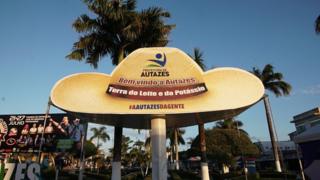This website uses cookies so that we can provide you with the best user experience possible. Cookie information is stored in your browser and performs functions such as recognising you when you return to our website and helping our team to understand which sections of the website you find most interesting and useful.
 Image copyright Thaïs Borges
Image copyright Thaïs BorgesAs Brazil's far-right President Jair Bolsonaro seeks to authorise mining in indigenous reserves, a conflict with 12,000 members of the Mura indigenous group over a big potash mine in a remote area of the Amazon rainforest may forewarn troubles that lie ahead, report Sue Branford and Thaïs Borges from Autazes.
The company wanting to open the mine is Potássio do Brasil, a subsidiary of the Canadian conglomerate Forbes & Manhattan. Potash is an important fertiliser used heavily by agribusiness.
In 2010 Potássio do Brasil discovered huge potash reserves in the municipal district of Autazes, 112km (70 miles) east of Manaus, the capital of Amazonas state. It quickly announced its plan to open a vast $2.5bn (£3.25bn) potash mine.
By a stroke of good luck for the mining company, the potash reserves are located beside the Madeira river, a waterway used to transport soya from Brazil's largest soya-producing state, Mato Grosso, to ports on the Amazon for transhipment on to China and Europe.
"Instead of travelling empty back up the Madeira River [to the soya farms in Mato Grosso], as happens today, the barges could go stacked full of potash," explains Guilherme Jácome, project development director at Potássio do Brasil. This would make the mine highly cost-effective.
Potássio do Brasil quickly obtained authorisation from Brazil's mining agency to drill exploratory wells and began prospecting in 2013.
'They are the invaders'
But then the indigenous communities woke up to what was happening. Speaking beside one of the exploratory wells, located on what the Mura claim is ancestral land, Aldinélson Pavão, the leader of the village of Urucurituba, could not hide his indignation.
"I am 47 years old," Mr Pavão said. "I was born here and brought up here. My parents and grandparents too. So I won't be told by Potássio, that comes from outside, that this land isn't ours. It is our land and they are the invaders."
One of the by-products of potash mining is vast amounts of salt.
The company insists it will prevent this salt leaching into aquifers and rivers. But the Mura remain concerned, given the region's high rainfall, extreme heat and its location on a flood plain.
Many Mura are also fearful of the future. "In 20 or 30 years the company will leave," said Mr Pavão. "It'll be our children and grandchildren who will suffer, as they'll find there are no more animals to hunt."
Project on ice
The Mura mobilised and, represented by Brazil's public prosecutor's office, reached a court-approved deal with Potássio do Brasil in March 2017.
You may also be interested in:
This has halted the project until a "free, prior and informed consultation" has been carried out. The rules for such a consultation are set out by the International Labour Organization's Indigenous and Tribal Peoples Convention, which Brazil has signed.
This is the first time that an indigenous community in Brazil has ever won the right to carry out such a consultation.
The Mura began the consultation process in November and members have three options: they can vote "no", "yes" or give conditional approval, meaning that they can agree to the mine going ahead, but only after certain conditions are met.
After having called in experts to provide impartial evidence, the Mura are now carefully weighing their options.
"The good part is that [the mine] will bring jobs,", said Francisco Oliveira, the leader of Taquara village. "The bad part is the impact it will have on the environment and on our people, because outsiders can bring in illness and prostitution."
But one serious doubt hangs over the process: will the government accept the result of the indigenous consultation as binding or will it simply ignore it?
The land where the company wants to locate the mine has not been demarcated as indigenous land, though the Mura claim it. For Potássio do Brasil, this means the mine can go ahead.
Mr Jácome said: "All of the mine and the area where potash ore will be extracted lies outside indigenous land."
But Carlos Marés, former president of Brazil's indigenous affairs agency, Funai, maintains that if any lands are permanently inhabited by indigenous groups then they are indigenous.
"Indigenous land is indigenous, whether or not it has been demarcated, which is after all only an administrative act of marking out the limits," Mr Marés explains.
What seems clear is that if the Mura turn down the mine, they will be on a collision course with the Bolsonaro administration which is reportedly already preparing legislation to permit large-scale mining on indigenous lands.



 Africana55 Radio
Africana55 Radio 
